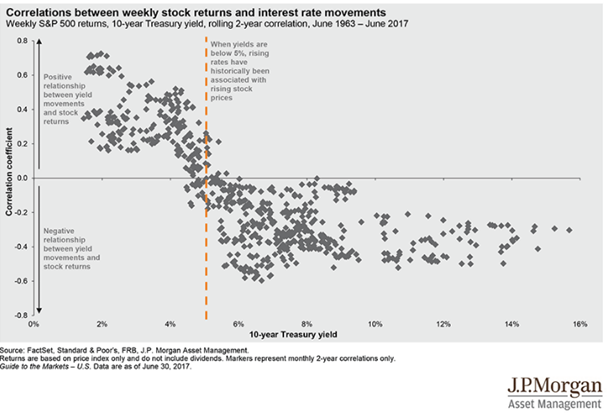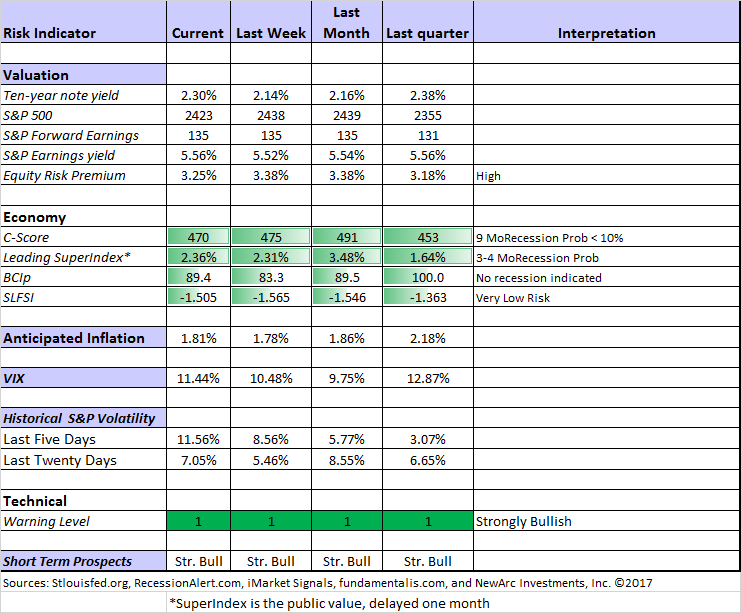Today Greg Ip opined that we should start worrying about a recession. He is the chief economics commentator for the WSJ. He held a similar position for the Economist, and he has written several books. As a journalist with an economics background, his mission is to understand the key economic concepts and help his readers to understand.
It is something like what I do, except that he has a much larger audience! I also must manage portfolios and my business, so writing is a sideline – albeit one which I love.
I read Mr. Ip’s work regularly and normally find it to be informed and helpful. That is why his column today was so disturbing. It was almost as if someone else had taken over his word processor.
A Closer Look
The Ip thesis is that there are certain “preconditions” for a recession. By that he seems to mean that he has looked at some past recessions and always found certain things happening in advance. Here is what he sees:
If you drew up a list of preconditions for recession, it would include the following: a labor market at full strength, frothy asset prices, tightening central banks, and a pervasive sense of calm.
This research methodology is backwards. To determine causality, you should look at hypothesized preconditions, and then determine a batting average. Sex offenders nearly always read Playboy (or the modern equivalent) as kids. That is a “precondition” that has nothing to do with causality. Serious addicts once smoked pot — but I’m sure you have the idea.
Since a recession, by definition, begins with a business cycle peak, things will always look good before the recession begins. The Ip methodology would have inaccurately signaled a recession for years, and done the same in past expansions. It is yet another manifestation of interpreting good news as bad.
Let us follow him as he takes up each individual argument. The narrative does not take up the points in order, so I will rearrange for clarity.
- He cites past instances of a tight labor market.
…when unemployment got nearly this low in 1989 and again in 2006, a recession was about a year away; but in 1998, it was three years away, and in 1965, four years. A narrowing spread between short-term interest rates and long-term rates comparable to the present has happened 12 times since 1962, and only five times did recession follow within two years.
J: Despite the lack of supporting data, he concludes that these conditions “expose vulnerabilities” just waiting for a catalyst for a recession or a “massive meltdown.”
- Frothy asset prices. He cites trailing PE ratios and housing prices.
J: Asset prices are not frothy. There is a debate over both methods and conclusions. The most obvious missing element is the continuing low rates of inflation and interest. There are astute people on both side of a vibrant debate. Since I am confident that Mr. Ip is well aware of this, why take only one side? Especially the side that has been so wrong, for so long?
- Tightening central banks. He writes:
Expansions don’t die of old age, economists like to say. On the other hand, should we really assume this one will be a record breaker? From a level this low, unemployment has more room to go up than down. Another ominous sign: Central banks are tightening monetary policy, which has preceded every recession. The Fed has raised rates three times since December and last week central banks in Britain, the eurozone and Canada all hinted that years of easy money were coming to an end.
J: This expansion will probably be a record breaker because it featured a deep decline and a slow recovery. Labor market slack is not just a matter of unemployment, but also underemployment and marginally attached workers. Central bank tightening may well lead eventually to a recession, but not gradual moves from low levels. Once again, Mr. Ip needs a little evidence. I have repeatedly cited the JP Morgan analysis showing that stocks do well as the ten-year moves to rates between four and five percent.

- The “pervasive sense of calm.” He draws this conclusion because the VIX is at its lowest level since 2007. This is supposed to imply that everyone is calm.
J: There are two things wrong with the VIX analysis. First, the VIX represents a market, not a near-unanimous vote of participants. A better analogy is differing but balanced opinions, strongly held. Surely Mr. Ip has read the many warnings about the imminent demise of stocks. These people are buying options, while others are selling.
Second, The VIX trades at a significant premium to actual volatility. There is plenty of fear built in, meaning that the “insurance premium” he describes is not low. It is quite healthy. (Compare VIX and actual in my weekly table).

Conclusion
The article also tosses in various stray points about business investment and high corporate debt, but there is only so much I can do in one post. Business investment is not really that high. Corporate debt is a normal market reaction to the ability to borrow long-term at low rates – something the Fed does not control. More could be said about each.
The entire article reads like a laundry list of points that would make sense to investors with limited knowledge of economics. That is why I am disappointed. My hope is that top journalists would help explain reality rather than feed fears stoked by so many others. This article will frighten investors. Is that what the author intends?
